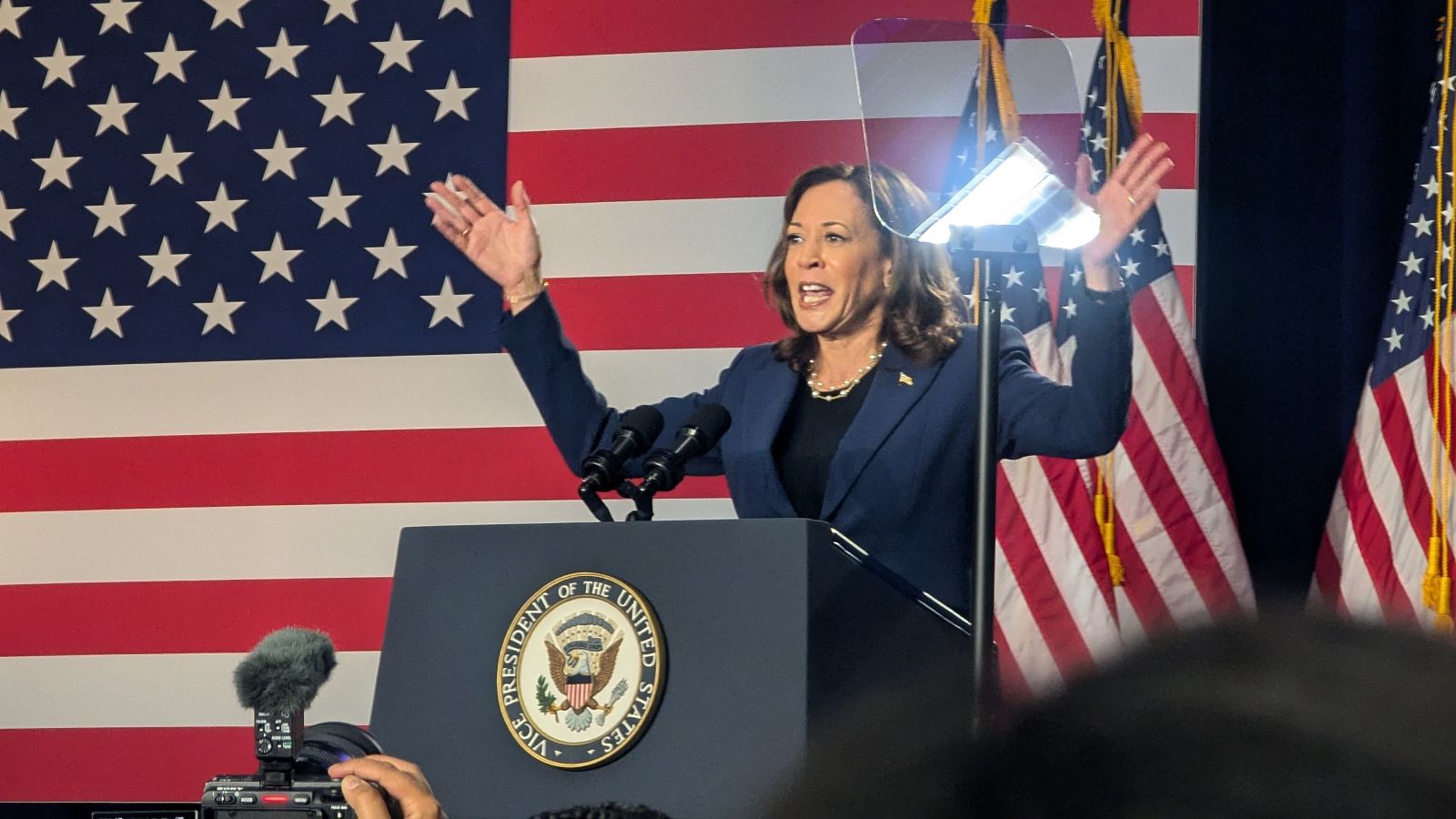Vice President Kamala Harris has grown her lead over former President Donald Trump in Wisconsin following their Sept. 10 debate, according to a new Wisconsin Watch poll conducted by The MassINC Polling Group and released on Monday.
Among 800 likely voters, Harris led Trump 53% to 46%, her largest lead in recent polling from this crucial swing state and nearly outside the survey’s +/-3.8% margin of error. In a multi-candidate race, Harris received 51% support to Trump’s 45%. Both independent candidate Robert F. Kennedy Jr. — who has dropped out of the race and endorsed Trump — and Green Party candidate Jill Stein each received about 1% support.
The Wisconsin Watch poll comes amid a flurry of post-debate swing state polling in recent days — mostly showing a too-close-to-call race. The latest Marquette Law School Poll, the most closely watched poll in the state, showed Harris up four points over Trump, but it was conducted before the debate, which post-debate polls show Harris won.
Among post-debate polls, an Emerson College poll found Trump at 50% and Harris at 49% in Wisconsin; a Marist College poll found Harris at 50% and Trump at 49%; and a Quinnipiac University poll found Harris at 49% and Trump at 48% — all statistical ties. A Morning Consult poll found Harris ahead 50% to 44%, larger than but still within the margin of error.
“If the election were held today … we’d be expecting to find (Harris) with a low single-digit lead (in Wisconsin),” said Steve Koczela, president of The MassINC Polling Group. He said “if that’s true, then we should expect the polls to range from somewhere a few points above that to a few points below that” when asked if he was concerned the poll found Harris receiving more support than in other polls.
But, Koczela cautioned, “it’s always possible that surges in turnout or lagging turnout from one group or another could change the results from what the polls show.”
“We don’t have to look very far back in history to see where that happened in the state of Wisconsin,” he continued. “So, we do the best we can, and then we’re waiting for Election Day like everybody else.”

The MassINC Polling Group’s polling operation is rated 2.8 out of 3 stars by poll aggregator FiveThirtyEight, ranking it among the top 20 most reliable polls in the country. Harris leads Trump in Wisconsin by about 2%, according to FiveThirtyEight’s polling average for the state.
Harris was also viewed more favorably by voters than Trump: 49% view her favorably while 48% view her unfavorably. For the former president, 44% view him favorably and 53% view him unfavorably. That represents a small improvement for both candidates compared to Marquette’s pre-debate poll.
The poll was conducted Sept. 12-18 by The MassINC Polling Group on behalf of Wisconsin Watch. Voters were reached via text message invitation to an online survey and by live telephone interviewers calling landline and cell phones. It was funded by a grant from the Knight Election Hub.
Head-to-head comparisons
In other poll findings, 44% of voters said the phrase “knows how to manage the economy” best describes Trump, while 43% of voters said the same about Harris.
That’s notable, Koczela said, because the economy “is the top issue in the election cycle.”
“If you’re going to only have one attribute that you’re doing well on, that’s the one you’d want to have,” he said. “I think that’s part of how Donald Trump is keeping the election close.”
More voters polled believed Harris will do a better job keeping America safe — 49% said the phrase “will keep America safe” best describes the vice president; 44% of respondents said the same about Trump. That comes as Trump and his allies once again try to make public safety a centerpiece of the campaign, as they’ve done in other recent elections.
Harris’ advantage here — still within the margin of error — bucks historical trends, Koczela said.
“Historically, (you) would very often expect to see Republicans winning by a fairly wide margin,” he said in an interview with Wisconsin Watch. “That’s a great number for Harris, to have perhaps a slight edge, but even to be in the same ballpark, I think is a great number for a Democrat when being compared to a Republican.”

A majority of respondents said Harris is “a person of strong moral character” (53%) and “mentally sharp” (54%). Just 26% said Trump “is a person of strong moral character,” and only 35% of respondents said he is “mentally sharp.”
Respondents also said Harris was more relatable than Trump, 50% to 33%; will better follow the law, 53% to 34%; and expresses a positive view of the future of America, 54% to 41%.
The poll also found that 59% of likely voters believed Harris did a better job in the debate; just 21% of those surveyed said Trump did a better job in the debate.
However, more respondents said Trump “will bring real change to Washington” than Harris, 41% to 37%, while 16% of voters said neither candidate would bring real change.
Among respondents to the poll, 32% said they were Democrats, 36% said they were Republicans and 32% identified as independent.
What issues matter most to voters?
Voters were asked to name any number of their top issues in the presidential race. The five issues mentioned the most were jobs, wages and the economy (64%), the future of democracy in America (62%), immigration policy (57%), Social Security and Medicare (50%), and abortion rights (49%), according to the poll.
Among Democrats, the five most important issues are the future of American democracy (81%), abortion rights (79%), the U.S. Supreme Court (69%), the character of each candidate (69%), and health care policy (64%). For Republicans, it’s immigration policy (78%), jobs, wages and the economy (71%), the national debt (61%), the future of American democracy (47%), and foreign policy (43%).
For independent voters, jobs, wages and the economy (69%) are the most important issues. That’s followed by the future of American democracy (60%), immigration policy (57%), Social Security and Medicare (51%), and the national debt (51%). Abortion rights (46%) were a close sixth.

Among men, the economy was the most important issue (65%), followed by the future of American democracy (58%) and immigration policy (57%). For women, the future of American democracy (66%) was the most important issue. The economy (62%) was second, and abortion rights (57%) were third.
Generally, 76% of those polled said they felt like their rights are being threatened. Just 15% said their rights are being well protected. Eighty-two percent of Republicans said their rights are being threatened, while 12% said they are being protected. Among Democrats, 71% felt like their rights are being threatened, and 19% felt they are being protected.
“Both sides have really put it on the table,” Koczela said. “The threats that they’re describing for their voters and using to motivate their voters are quite different. But it does make sense that both parties would see that as a key issue.”
Women, in particular, felt like their rights are being threatened — 81% said as much in the poll, with only 11% of women reporting they feel like their rights are being well protected.
Toplines from the poll can be found here. Crosstabs from the poll can be found here.
This article first appeared on Wisconsin Watch and is republished here under a Creative Commons license.![]()
The Mysteries Around Aaron Rodgers Detailed in New Unauthorized Biography
9/23/2024 | Teri Barr
Author Ian O’Connor discusses the complexities of Aaron Rodgers, from his on-field brilliance to his off-field estrangement, on Nite Lite with Pete Schwaba.
Democrat seeks to flip GOP suburban Milwaukee seat with focus on abortion rights, tax cuts
9/23/2024 | Jack Kelly / Wisconsin Watch
The contest pits incumbent Sen. Duey Stroebel, R-Saukville, against environmental attorney and small business owner Jodi Habush Sinykin, a Democrat from Milwaukee.
Applications Open for Racine’s 14th District Council Seat
9/23/2024 | Stuart J. Wattles
Interested candidates must apply before October 4.
Trump Campaign Launches Wisconsin Bus Tour as Harris Leads in Polls
9/23/2024 | Stuart J. Wattles
It concludes with a town hall event in Waukesha on Wednesday
Brown County sees a 50% reduction in opioid-related deaths
9/23/2024 | Lisa M. Hale
Brown County has seen a 50% reduction in opioid-related deaths due to awareness campaigns and the efforts of an overdose task force in the Brown County Public Health Department.

